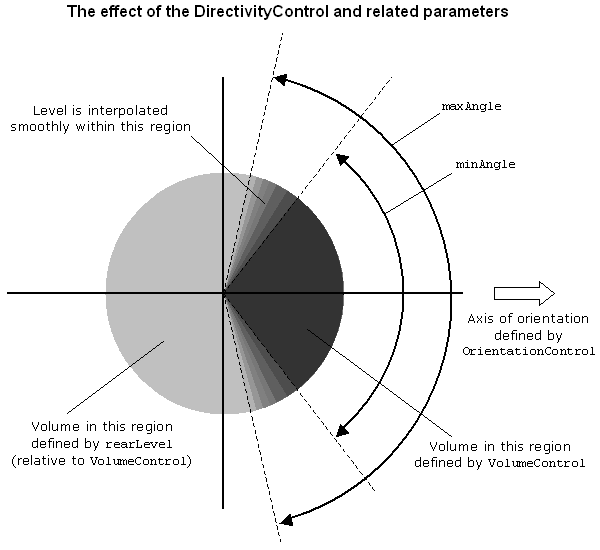
|
1.0: Final Release | |||||||||
| PREV CLASS NEXT CLASS | FRAMES NO FRAMES | |||||||||
| SUMMARY: NESTED | FIELD | CONSTR | METHOD | DETAIL: FIELD | CONSTR | METHOD | |||||||||
DirectivityControl adds to OrientationControl a method for setting the directivity pattern of a sound source.
The following diagram illustrates (in 2D) how the parameters of the
DirectivityControl affect the intensity of sound perceived by
the Spectator at various angles
from the sound source's axis of orientation
(defined by DirectivityControl's methods inherited from
OrientationControl). In reality,
minAngle and maxAngle define two sound
cones which radiate outwards in 3D space from the location of the sound
source, rather than sectors as shown in the diagram. Note that the actual
volume perceived also attenuates with distance from the sound
source, according to the parameters of the DistanceAttenuationControl.

The default values for the properties of all directivity controls (whether the application has obtained them or not) are:
minAngle = 360 degrees
maxAngle = 360 degrees
rearLevel = 0 mB
Control,
OrientationControl,
DistanceAttenuationControl| Method Summary | |
int[] |
getParameters()
Gets the directivity pattern of a sound source. |
void |
setParameters(int minAngle,
int maxAngle,
int rearLevel)
Sets all the directivity parameters simultaneously. |
| Methods inherited from interface javax.microedition.amms.control.audio3d.OrientationControl |
getOrientationVectors, setOrientation, setOrientation |
| Method Detail |
public void setParameters(int minAngle,
int maxAngle,
int rearLevel)
Sets all the directivity parameters simultaneously.
The minAngle and maxAngle parameters define the
inner and outer sound cones, respectively. The symmetry axis of the cones is the orientation axis defined by setOrientation(int heading, int pitch, int roll) (or the front vector defined by setOrientation(int[] frontVector, int[] aboveVector)). The effect of the cones depends on the location of the Spectator as follows:
rearLevel relative to the level inside the inner cone.
The sound can be completely muted in the region outside the outer cone by
setting rearLevel to Integer.MIN_VALUE. (In practice,
the implementation will probably then interpolate linearly in
the logarithmic (level)
domain from the maximum level (at minAngle) to the quietest
level it supports (at maxAngle), which will be
approximately -90 dB if the native processing uses 16-bit samples, or
about -140 dB for 24-bit samples.)
Setting the rearLevel to 0 or setting both angles
to 360 degrees causes the sound source to revert once again to
being an omnidirectional source, which is the default state—no directivity
attenuation.
NOTE: If minAngle = maxAngle then when the Spectator happens to be located exactly on the common surface of both cones, the perceived level is unattenuated (as though the Spectator were within the inner cone), this being consistent with the omnidirectional behaviour where minAngle = maxAngle = 360. In the exceptional case that minAngle = maxAngle = 0, the perceived level is always maximally attenuated (as though the Spectator were within the outer cone). In all cases the implementation should ensure that the transition from the inner cone to the outer cone is smooth.
minAngle - the total angle in degrees (a value from 0 to
360 inclusive), subtended by the inner cone at its vertexmaxAngle - the total angle in degrees (a value from 0 to
360 inclusive, where minAngle <= maxAngle),
subtended by the outer cone at its vertexrearLevel - the level in millibels (mB, 1 mB = 1/100 dB), at which the sound from a
source will be heard at maxAngle and wider angles; must be a
non-positive value. Setting the rearLevel to 0 makes the source omnidirectional.
java.lang.IllegalArgumentException - if minAngle and
maxAngle are not between 0 and 360
inclusive
java.lang.IllegalArgumentException - if maxAngle < minAngle
java.lang.IllegalArgumentException - if rearLevel > 0public int[] getParameters()
minAngle, maxAngle and rearLevel
parameters, in that ordersetParameters(int, int, int)
|
1.0: Final Release | |||||||||
| PREV CLASS NEXT CLASS | FRAMES NO FRAMES | |||||||||
| SUMMARY: NESTED | FIELD | CONSTR | METHOD | DETAIL: FIELD | CONSTR | METHOD | |||||||||